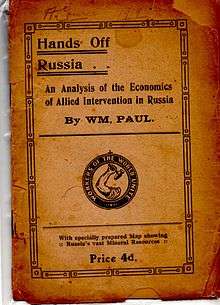Hands Off Russia
The Hands Off Russia campaign was an international political initiative first launched by British Socialists in 1919 to organise opposition to the British intervention on the side of the White armies in the Russian Civil War. The movement was encouraged by the fledgling Communist International and ultimately emulated in several other countries, including the United States, Canada, and Australia.
History
The National Committee for the Hands off Russia Movement was elected at a conference in London in January 1919. Socialists like William Paul, W. P. Coates (national secretary), Harry Pollitt (national organiser), David Ramsay (treasurer) and Alfred Comrie were active in the campaign.[1] In 1920 East London dockers refused to load the freighter SS Jolly George with arms headed for Russia.[2]

The initial committee members were: Mary Bamber, Isaac Brassington, John Bromley, Alexander Gordon Cameron, Rhys Davies, Robert Dunstan, William Gallacher, W. T. Goode, Alex Gossip, Harold Granville Grenfell, David Kirkwood, George Lansbury, Cecil L'Estrange Malone, Ernest Mander, Tom Mann, John Edmund Mills, Tom Myers, George Peet, Fred Shaw, Robert Smillie, Ben Spoor, and James Winstone.[3]
In 1919, William Paul published Hands off Russia which claimed:
The imperialist Powers know that the very essence of Socialism is its international policy of a World Republic of Labour. They realise that the triumph of Socialism in Russia is but the first step towards the triumph of Socialism internationally. Hence their united designs and attacks to crush the Bolsheviks in order to prevent the spread and triumph of revolutionary Socialism in other countries. ...
The sheer savagery of these [White Russian] usurpers has only had the effect of driving honest moderate socialists and non-Bolshevik elements into the camp of Lenin and Trotsky.[4]
Sylvia Pankhurst reported in August 1919 that:
For months past "Hands Off Russia" has found its way into the resolution of every labour and Socialist propaganda meeting and literature about Russia has been the more eagerly read than any other.[5]
Many of those who were active in the Hands off Russia Campaign would go on to found the Communist Party of Great Britain.
In 1924, Ramsay MacDonald's Labour government established diplomatic relations with the Soviet Union, and in light of this the committee was renamed as the Anglo-Russian Parliamentary Committee.[6]
Footnotes
- Katsman, G. V. (3rd Edition (1970-1979).). The Great Soviet Encyclopedia. Moscow & London: Macmillan. Check date values in:
|year=(help) - TUC History Online. "1918-1939". Timeline. Trades Union Congress. Retrieved 5 August 2012.
- Dictionary of Labour Biography, vol.IX, p.106
- Paul, William (1919). Hands off Russia!. Renfrew: Socialist Labour Press. pp. 13, 16.
- Pankhurst, Sylvia (9 August 1919). "The British Workers and Soviet Russia". The Revolutionary Age.
- Stevenson, Graham. "Coates WP (Pat)". Graham Stevenson. Graham Stevenson. Retrieved 16 February 2016.
Publications
- William Paul, Hands Off Russia: An Analysis of the Economics of Allied intervention in Russia. Glasgow: Socialist Labour Press, n.d. [c. 1919].
- n.a. [A. Raphailoff], Hands Off Soviet Russia! New York: Communist Labor Party of America, 1919.
- Israel Zangwill, Hands Off Russia: Speech at the Albert Hall, February 8th, 1919. London: Workers' Socialist Federation, n.d. [1919].
Ephemera
- Circular Letter of Canadian "Hands Off Russia Committee," Toronto, ON, n.d. [September 1920].